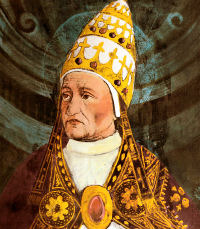Christmas: December 30th
Sixth day in the Octave of Christmas
Other Commemorations: St. Felix I, Pope and Martyr (RM)
» Enjoy our Liturgical Seasons series of e-books!
It would be ideal if we could devote several days of the Christmas octave to quiet contemplation, entering ever more deeply into the sweet and profound mystery of the Incarnation; yet much of the time is devoted to the saints. All the more precious, therefore, is this day, an unencumbered Christmas day.
God became Man. Utterly incomprehensible is this truth to our puny human minds! That the eternal God whom heaven and earth cannot contain, who bears the world in His hand as a nutshell, before whom a thousand years are as one day — that this eternal, omnipotent God should become Man! Would it not have been a tremendous condescension if for the redemption of mankind He had simply sent an angel? Would it not have proven His loving mercy had He appeared for a mere moment in the splendor of His majesty, amid thunder and lightning, as once on Sinai? No, such would have shown far too little of His love and kindness. He wanted to be like us, to become a child of man, a poor child of poorest people; He wished to be born, in a cave, in a strange land, in hostile surroundings. Cold wind, hard straw, dumb animals — these were there to greet Him. The scene fills us with amazement; what other can we do than fall down in silence and adore!
 In heaven only will we comprehend the profound implications of Christ's redemptive acts, surely one of the exquisite joys of celestial blessedness. But some points Mother Church allows us to anticipate here below. She, enlightened by the Holy Spirit, is ever the recollected woman "who meditates on all the words of God and keeps them in her heart." She tells us: God became Man that we might share His divine nature. Isn't that mankind's long-cherished dream? "You shall be as God, knowing good and evil," Satan whispered into man's ear in paradise; and his whisper was believed. What a miserable betrayal! Indeed, man experienced good and evil, but he had not turned divine. Thousands upon thousands of years of dreadful distance from divinity, with nought but failure in scanning the skies! Not by pride can man become God, but by submission, humility.
In heaven only will we comprehend the profound implications of Christ's redemptive acts, surely one of the exquisite joys of celestial blessedness. But some points Mother Church allows us to anticipate here below. She, enlightened by the Holy Spirit, is ever the recollected woman "who meditates on all the words of God and keeps them in her heart." She tells us: God became Man that we might share His divine nature. Isn't that mankind's long-cherished dream? "You shall be as God, knowing good and evil," Satan whispered into man's ear in paradise; and his whisper was believed. What a miserable betrayal! Indeed, man experienced good and evil, but he had not turned divine. Thousands upon thousands of years of dreadful distance from divinity, with nought but failure in scanning the skies! Not by pride can man become God, but by submission, humility.
Bethlehem gave the great revelation. God put on the beggar's garb, became a tiny, crying Babe in order to show man how to become divine. In paradise a fallen angel had promised: Eat of this fruit and you will be like God. He ate and became a prisoner of hell. On Christmas night another angel (the Church) stands before man, offers him a Good and says: Eat of this and you will be like God. For the divine Food, the Flesh of the incarnate Son of God, makes us "partakers of the divine nature."
— The Church's Year of Grace, Pius Parsch
St. Felix
 St. Felix was a Roman by birth and succeeded St. Dionysius in the government of the church in 269. Paul of Samosata, the proud bishop of Antioch, to the guilt of many enormous crimes, added that of heresy, teaching that Christ was no more than a mere man, in whom the Divine Word dwelt by its operation, and as in its temple, with many other gross errors concerning the capital mysteries of the Trinity and Incarnation.
St. Felix was a Roman by birth and succeeded St. Dionysius in the government of the church in 269. Paul of Samosata, the proud bishop of Antioch, to the guilt of many enormous crimes, added that of heresy, teaching that Christ was no more than a mere man, in whom the Divine Word dwelt by its operation, and as in its temple, with many other gross errors concerning the capital mysteries of the Trinity and Incarnation.
Two councils were held at Antioch to examine his cause, but by various arts and subterfuges, he escaped condemnation. However, in a third, assembled at the same place in 269, being clearly convicted of heresy, pride, and many scandalous crimes, he was excommunicated and deposed, and Domnus was substituted in his room. Paul still maintained himself in the possession of the episcopal house. The bishop, therefore, had recourse to Emperor Aurelian, who, though a pagan, gave an order that the house should belong to him to whom the bishops of Rome and Italy adjudged it, as Eusebius writes.[1]
St. Felix had before declared himself against that heresiarch; for the council had sent the synodal letter to St. Dionysius, who being dead, it had been delivered to St. Felix. It must have been on that occasion that our holy pope wrote to Maximus, bishop of Alexandria, a learned epistle, quoted by the council of Ephesus, St. Cyril of Alexandria, and St. Vincent of Lerins; in which he clearly explained the Catholic doctrine of the whole mystery of the Incarnation. St. Cyril has preserved us a fragment of it.[2]
The persecution of Aurelian breaking out, St. Felix, fearless of dangers, strengthened the weak, encouraged all, baptized the catechumens, and continued to exert himself in converting infidels to the faith. He himself obtained the glory of martyrdom; which title is given him by the council of Ephesus,[3] by St. Cyril, 4 and by St. Vincent of Lerins. 5 He governed the church for five years and passed to a glorious eternity in 274. The western Martyrologies name him on the 30th of May.[4]
The example of Christ, and of all his saints, ought to encourage us under all trials to suffer with patience, and even with joy. We shall soon begin to feel that it is sweet to tread in the steps of a God-man, and shall find that if we courageously take up our crosses, he will make them light by bearing them with us. The soul will find it sweet to be abandoned by creatures, that she may more perfectly feel their emptiness, and learn that men are false and treacherous. Then will she place her whole confidence in God alone, and cleave to him with her whole heart. Forsaken and forgotten by creatures, she finds no relish but in God who enters her more powerfully, and fills her with his consolations the more sweetly, as she is the more weaned and separated from all earthly things, and more purely adheres to him who never forsakes those who sincerely seek Him. O happy exchange! cries out St. Francis of Sales; the soul thus abandoned in the eyes of men, now possesses God instead of creatures.[5]
Note 1. L. 7, c. 80, p. 282. [back]
Note 2. Apologet. p. 852. [back]
Note 3. Act. 1, Conc. t. 1, p. 512. [back]
Note 4. Apol. t. 3, Conc. p. 852. [back]
Note 5. P. 375. [back]
—Excerpted from The Lives of the Fathers, Martyrs, and Other Principal Saints, Volume 7
Highlights and Things to Do:
- Read more about Pope St. Felix I:






